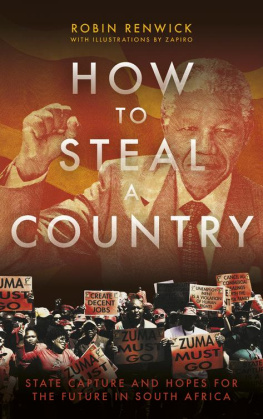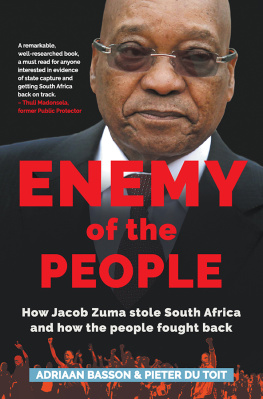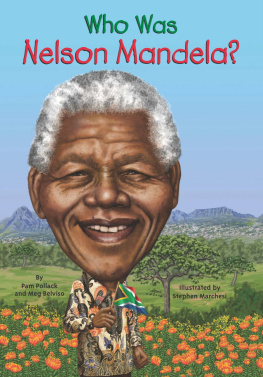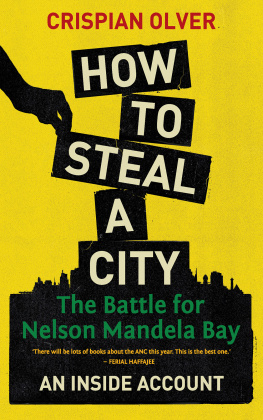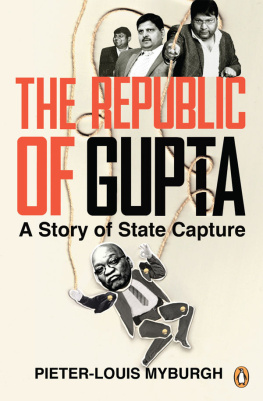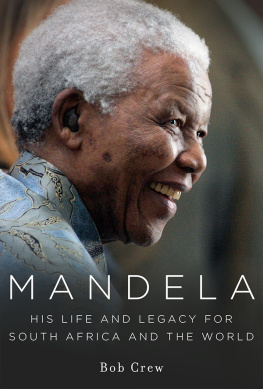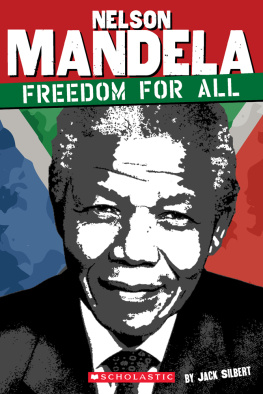For Thuli Madonsela, Pravin Gordhan and all those in the press, judiciary and civil society who combined to save South Africa and its constitution under threat.
T his book describes the vertiginously rapid descent of political leadership in South Africa from Mandela to Zuma, and its consequences. It may read in parts like a novel a crime novel for Sherlock Holmes old adversary, Professor Moriarty, the erstwhile Napoleon of Crime, would have been impressed by the ingenuity, audacity and sheer scale of the looting of the public purse in South Africa and the impunity with which it has been accomplished.
Readers will find an impressive array of rogues and villains in this account, together with some authentic heroes and heroines. But this is also an uplifting story. For though the odds appeared to be stacked against them and it looked for a while as if they could lose out decisively, those struggling for the chance of a better government in the end prevailed by just ninety votes.
Is there something in the nature of liberation movements that causes them, once power is achieved, to morph into kleptocracies, as in Angola, Zimbabwe and South Africa under Zuma? Or is it a function of leadership? How is it that internationally reputable companies such as KPMG, McKinsey, SAP and HSBC are so easily drawn into such a web of corruption?
Is such a process reversible? In South Africa we are about to find out.
In the last years of apartheid, it fell to me to persuade Margaret Thatcher that there could be no solution for South Africa without the ANC. Mandela, however improbably, kept urging me to join it because, he said, You think like us. I told him that I thought like him, but not like a lot of his colleagues. I was fortunate also to count Oliver Tambo as a friend and, in my opinion, the ANC alone was capable of governing South Africa in the first two decades after majority rule. When the only two signed copies of the Freedom Charter came up for auction, I was glad to help buy them for the Liliesleaf Trust and the national archives, it being South Africas version of Magna Carta. Although the movement had long since had its dark side, given the divisions of the opposition left and right, there are many who have continued to believe that the best outcome for South Africa would be for the ANC to reform itself, the question being whether it can find the capacity to do so.
Corruption has become so endemic within the ruling party, a way of life for so many of the party cadres at the centre and in the regions, that there still are many doubts on that score. Cyril Ramaphosa will have a titanic struggle to do better, but ending the spectacular looting of the state-owned enterprises, which has inflicted so much damage on the economy and the public finances, should be within his grasp.
Twenty-four years into majority rule, the black middle class is numerically stronger, and soon will have more purchasing power, than their white counterparts. The private sector still is dominated by white South Africans, who also own two thirds of the commercially cultivable land. There has been a tidal wave of affirmative action, biased towards the politically connected. The post-apartheid governments have provided low-cost houses, electricity and clean water for millions of black South Africans who had no access to them before. Social grants are being provided to almost 18 million people one third of the population who would be in truly desperate poverty without them, but no dent has been made in the vast army of the unemployed.
Acknowledging these major achievements is very different to accepting the partys legitimacy under the presidency of Jacob Zuma. The country has deserved better than the looting of state coffers to which it has been and currently still is subjected. For, despite all the problems from its tragic past, South Africa has succeeded in establishing a non-racial society full of remarkably determined, talented and enterprising people, offering plenty of hope for the future. They include the serried ranks of courageous independent journalists, black and white, who have proved no more able to be silenced today than they were under apartheid, and the judges, who have acted with equal courage and independence. The country contains too much talent, and too large an emerging middle class, to be turned into a banana republic.
Mandela, in my experience, was genuinely colour blind. At his trial, he declared that he was against white domination, he also was against black domination. He wanted white South Africans to feel safe. He understood that the new South Africa could not thrive without the vital contribution the white community makes to the economy.
The rhetoric from those who just, so narrowly, lost the ANC presidency, was increasingly race based. Instead of attributing the countrys ills to the failure to tackle unemployment and promote economic growth, they were supposed to be the fault of white minority capital, whereas the only monopolies in fact are the state-owned enterprises, where the worst problems lie. While further transformation certainly will now take place, it is likely to be on a more rational basis.
It is unwise to despair about the Beloved Country of Alan Paton and Nelson Mandela any more than they did, in far worse circumstances. The incredibly narrow cliff-hanging victory of Cyril Ramaphosa and his succession as President will provide far greater integrity at the head of the party and of the country. His greatest difficulty is going to be in dealing with his own colleagues, half of whom, for the past nine years, have been pillars of the Zuma regime.
Yet this wafer-thin victory was of fundamental importance for the South African economy and for the constitution. For continuance of the Zuma regime was fast approaching the point at which it would have proved incompatible with a free press and judiciary, or with free elections.
So how did this extraordinary result come about? It was a famous victory for the still fiercely independent South African press, for a fearless judiciary, a formidably effective and highly motivated civil society and for the outstanding examples set by such champions of integrity as Thuli Madonsela and Pravin Gordhan, battling a fundamentally corrupt and evil system. One of those who did so most effectively, the cartoonist Zapiro, has provided the illustrations for this book. The cumulative effect of their efforts was to persuade delegates who voted for Ramaphosa that, otherwise, they would lose the next election.
So contrary to many expectations, including those at times of the present author, this grim story has become a more hopeful one. Ramaphosa was Mandelas choice to succeed him. The challenges facing him will be huge and will come more from his colleagues than from his political opponents. The jury is still out on whether the ANC will prove to be reformable. But this magnificent country once again will have a President committed to honouring the constitution he helped to negotiate.
I argued with someone who said that the country comes first and I said as much as I understand that, I think my organisation, the ANC, comes first.
J ACOB Z UMA , 7 N OVEMBER 2015
I n March 2014, South Africas Public Protector, Thuli Madonsela, addressed a packed meeting of students at Wits University in Johannesburg. She had recently published her report, entitled Secure in Comfort, on the 246 million rand worth of security upgrades at President Zumas homestead in the desperately poor neighbourhood of Nkandla in rural KwaZulu-Natal.
Speaking almost in a whisper to a rapt overspilling audience in the Senate Hall, she observed that
George Orwell tells us about a community, pretty much like ours, but its a community of animals. These animals were enslaved by humans, and the humans made those animals work very hard the humans ate all of the food and gave the animals very little. Over time, among the animals, leaders emerged that started to tell the animals that its not right to be oppressed by humans one day the animals revolted and kicked the humans out of the farm.

